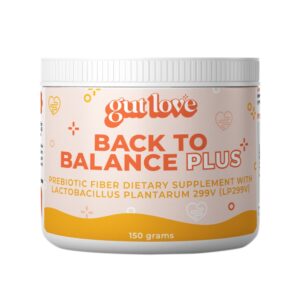Have you ever been curious about probiotics for bloating? Let’s talk about it.
Persistent issues like bloating, gas, abdominal pain and unpredictable stool pattern can impact so many areas of our lives. I was recently shocked to find out just how common these issues are. A study conducted on 89,000 Americans revealed that 13.9% of the participants experienced bloating. Interestingly, over of those affected by bloating never even sought professional care for their bloating.
Close to one third of those surveyed resorted to self-management or avoided discussing the problem altogether. Self management isn’t necessarily a bad thing, but only if it’s actually working! When we look at statistics on patient satisfaction with help with bloating, gas, diarrhea and constipation over 65% of patients aren’t satisfied with medications that are usually used to treat these symptoms (2).
One of the other drawbacks of conventional prescribed options, such as Metamucil and Miralax, is their tendency to cause fluctuation between extremes rather than addressing the deeper issues. Additionally, these traditional treatments often fail to alleviate bloating, gas, or abdominal pain.
This is why we created a better solution – rooted in science and our own clinical experience.
Probiotics for Bloating
The probiotic found in our top selling product is called Lactobacillus plantarum 299v and it has a lot of great research to back up it’s use for bloating – especially when paired with the prebiotic found in Back to Balance Plus.
The strain L. plantarum 299v have established it as a probiotic for IBS symptoms based on the 2017 guidelines of the World Gastroenterology Organisation.
Reducing Gas and Abdominal pain
A study with 52 patients with IBS symptoms taking 20 billion CFU per day of the L. plantarum 299v strain for four weeks resulted in a 44% reduction of flatulence and abdominal pain.
Decrease in Abdominal pain and Frequency
A double-blind randomized trial of 204 IBS patients took 10 billion CFU of the probiotic or placebo for four weeks. By the second week, patients taking the 299v probiotic experienced a significant decrease in frequency and severity of abdominal pain as compared to placebo.
Also, 78% of participants had excellent or good effects on their overall symptoms after consuming the probiotic and only 8% on the placebo had improvement.
One of the Best Probiotics for Bloating
A randomized controlled trial (RCT) with 40 patients was randomized to placebo or 10 billion CFU of the 299v probiotic strain for four weeks. The results showed that 70% of those taking L. plantarum 299v resulted in complete resolution of abdominal pain for all those at the end of the four weeks.
Also, 95% of the patients taking L. plantarum 299v improved ALL IBS symptoms including bloating, while only 15% of the placebo consumers experienced improvement.
Intoducing Back to Balance Plus
Our Back to Balance Plus not only contains the best probiotic for bloating – but it also contains one of the most effective and versitile prebiotics on the market, SunFiber. Unlike most prebiotics that primarily target
either constipation or diarrhea, our formula is one of the few that can effectively address both issues and improve overall stool patterns in addition to helping alleviate bloating, gas and abdominal pain just like the probiotic does.
This dynamic duo has been our go-to for years for helping to reduce symptoms for many.
One of the drawbacks of conventional prescribed options, such as Metamucil and Miralax, is their tendency to cause fluctuation between extremes rather than addressing the deeper issues. Additionally, these traditional treatments often fail to alleviate bloating, gas, or abdominal pain.
To overcome these challenges, I carefully formulated and manufactured Back to Balance with precision and transparency. Our product undergoes rigorous third-party testing to ensure the highest quality and accuracy in labeling. What sets Back to Balance apart is its tasteless profile and seamless mixability with any beverage, including hot liquids like coffee or matcha, without losing potency. With Back to Balance, you can enjoy a convenient and sustainable solution for optimal gut health.
Hope you enjoyed our blog on Probiotics for bloating! Cheers to less bloating & better 💩’s!
References:
Hungin AP, Chang L, Locke GR, Dennis EH, Barghout V. Irritable bowel syndrome in the United States: prevalence, symptom patterns and impact. Aliment Pharmacol Ther. 2005;21:1365–75.
Harris LA, Horn J, Kissous-Hunt M, Magnus L, Quigley EMM. The better understanding and recognition of the disconnects, experiences, and needs of patients with chronic idiopathic constipation (BURDEN-CIC) study: results of an online questionnaire. Adv Ther. 2017;34:2661–73.
Lee HJ, Choi JK, Ryu HS, et al. Therapeutic modulation of gut microbiota in functional bowel disorders. J Neurogastroenterol Motil. 2017;23:9‐19. [DOI] [PMC free article] [PubMed] [Google Scholar]
Niv E, Halak A, Tiommny E, Yanai H, Strul H, Naftali T, Vaisman N. Randomized clinical study: Partially hydrolyzed guar gum (PHGG) versus placebo in the treatment of patients with irritable bowel syndrome. Nutr Metab (Lond). 2016 Feb 6;13:10. doi: 10.1186/s12986-016-0070-5. PMID: 26855665; PMCID: PMC4744437.
Simren M, Barbara G, Flint HJ, et al. Intestinal microbiota in functional bowel disorders: a Rome foundation report. Gut. 2013;62:159‐176. [DOI] [PMC free article] [PubMed] [Google Scholar]
Bron PA, Kleerebezem M, Brummer RJ, et al. Can probiotics modulate human disease by impacting intestinal barrier function? Br J Nutr. 2017;117:93‐107. [DOI] [PMC free article] [PubMed] [Google Scholar]
Bermudez‐Brito M, Plaza‐Diaz J, Munoz‐Quezada S, Gomez‐Llorente C, Gil A. Probiotic mechanisms of action. Ann Nutr Metab. 2012;61:160‐174. [DOI] [PubMed] [Google Scholar]
Sarkar A, Mandal S. Bifidobacteria – insight into clinical outcomes and mechanisms of its probiotic action. Microbiol Res. 2016;192:159‐171. [DOI] [PubMed] [Google Scholar]
Sen S, Mullan MM, Parker TJ, et al. Effect of Lactobacillus plantarum 299v on colonic fermentation and symptoms of irritable bowel syndrome. Dig Dis Sci. 2002;47:2615‐2620. [DOI] [PubMed] [Google Scholar]
